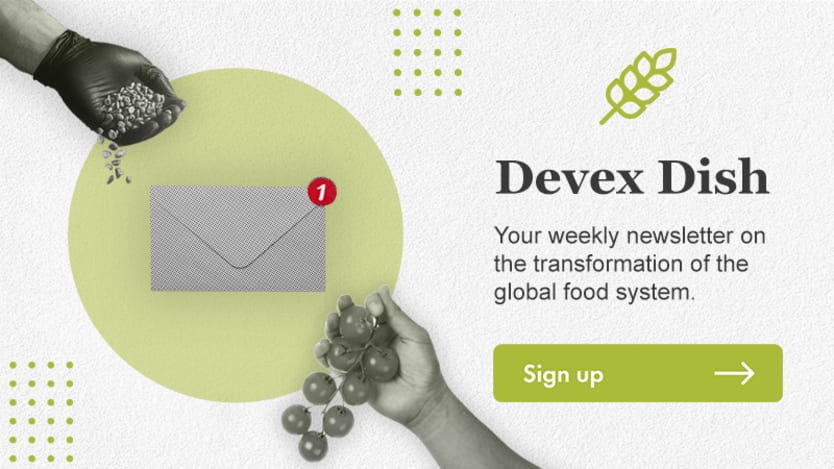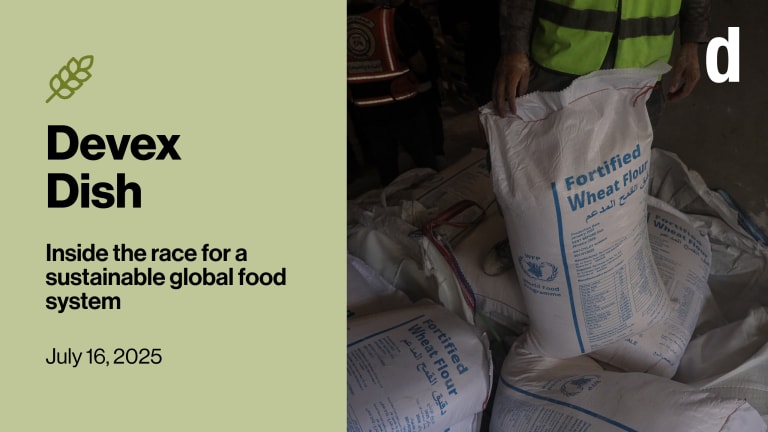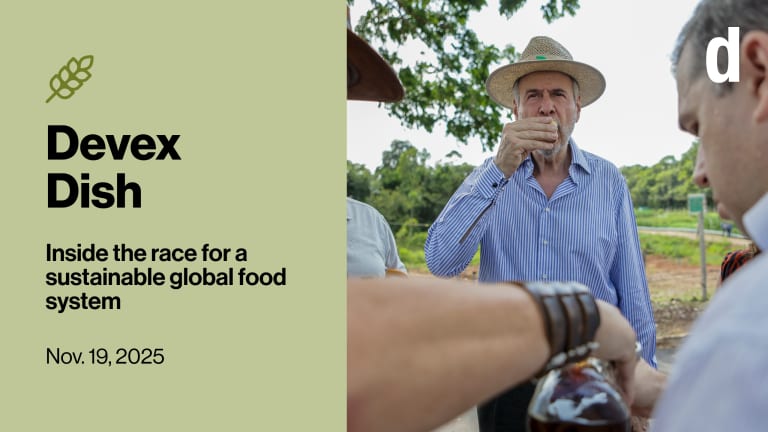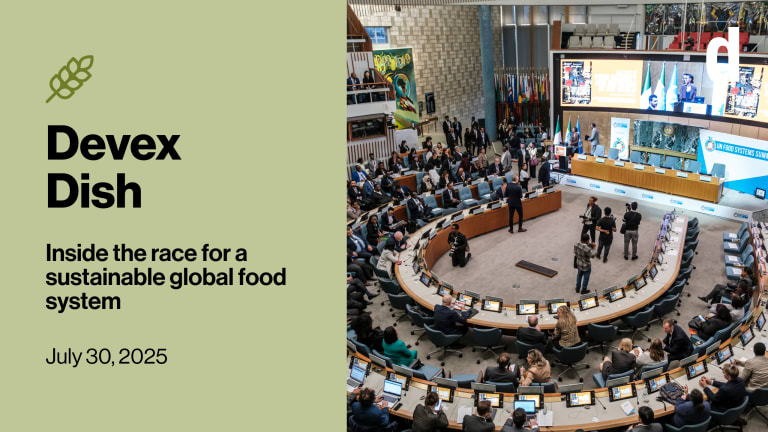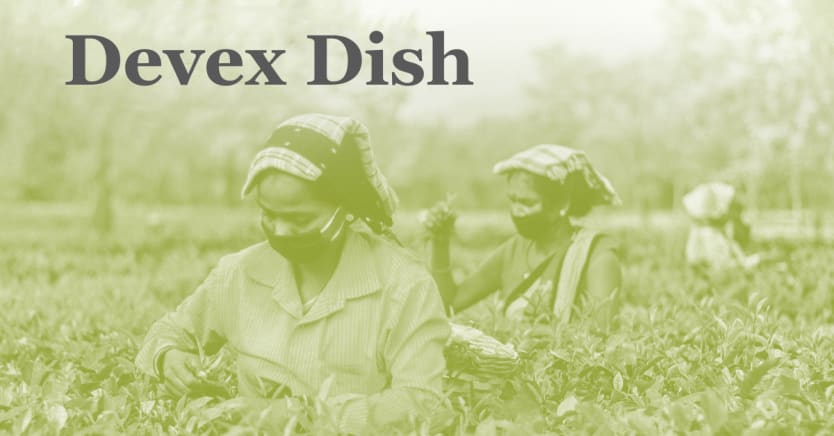
All eyes are on Scotland this week amid COP 26, and I’ve been interested to see how much international attention the gathering is getting — not because I don’t think the fate of our planet deserves it, but because the U.N. General Assembly and other events this year were met with crickets despite the multitude of global crises. (Seeing the development issues that our community focuses on every day in the headlines of major news outlets always gives me “Twilight Zone” vibes — anyone else?)
This is a preview of Devex Dish
Sign up to this newsletter to get the inside track on how agriculture, nutrition, sustainability, and more are intersecting to remake the global food system in this weekly newsletter.
Of course, my focus will be on the food systems conversations happening at COP 26. The only trouble is, those are going to be tough to find on the formal agenda, as none of the days’ themes corresponds to food systems. Those that get close — such as “nature” — aren’t enough, Ruth Richardson, the head of the Global Alliance for the Future of Food, tells me.
“We’ve really put a push on the need for connecting up all these agendas: the climate, nature, food, and I would even go further and say health and equity,” Richardson says. “These are all so intimately connected, and we cannot really separate them out.”
But members of civil society are there in force, and they’re the real drivers of change, according to Saleemul Huq, who led one of the “action tracks” at the recent U.N. Food Systems Summit. He says he’s taken to calling COP the “conference of people,” because those outside official negotiations are going to be the ones who take real action.
There are sure to be additional announcements related to food systems as the multitude of side events unfold. Although I will be away next week — finally attending a thrice-rescheduled pandemic-era wedding — my colleague Rumbi Chakamba will have you in good hands. You can let us know about any announcements your organization is making during COP 26. Write to the team at dish@devex.com.
Read: COP 26 agenda comes up short on food systems, advocates say
+ Sign up for our special edition newsletter to receive all the highlights of our COP 26 coverage.
Get out the popcorn
Have you been following the Twitter back and forth between World Food Programme chief David Beasley and billionaire Elon Musk?
To catch you up: Two weeks ago, Beasley tweeted his congratulations to the Tesla CEO as he overtook Jeff Bezos as the world’s richest man. Beasley also challenged Musk to direct some of his wealth — $6.6 billion — towards saving 42 million people from starvation. CNN then ran an inaccurate headline — which they later corrected — stating that Beasley had claimed that figure would solve world hunger completely. Musk himself got dragged into the … Actually, let me just show you:
Beasley then went on CNN yesterday to make the case: “I will show him. We will put it out in front of him. We have all the cost accounting, public transparency — any and everything that he would ask, we would be glad to answer. And I look forward to having this discussion with him because lives are at stake.”
Will Musk bite? I’ll be watching.
Number munching
$575 million
—That’s the amount pledged by funders to the Consultative Group on International Agricultural Research, the global agriculture research partnership. It includes $315 million from the Bill & Melinda Gates Foundation to “help hundreds of millions of smallholder farmers adapt to a surge of climate threats now imperiling the global fight against hunger and poverty.” The United States Agency for International Development pledged $215 million over five years, and Canada committed $45 million.
ICYMI: Philanthropies, governments pledge $1.7B to Indigenous climate efforts
Water shortage
Bringing home the bacon: Your next job
Director of Global Food and Water Policy
The Nature Conservancy
United States
The climate crisis is threatening lives in Madagascar, according to Amnesty International. Four consecutive droughts have severely challenged access to food in the island country off Africa’s east coast. Around 1.14 million people are facing food insecurity, with nearly 14,000 in a state of “catastrophe” — the most extreme category in the Integrated Food Security Phase Classification system.
Agnès Callamard, secretary-general at Amnesty International, said in a statement that “this is a wake-up call for world leaders to stop dragging their feet on the climate crisis.”
“World leaders must rapidly cut emissions to avert further climate-driven humanitarian crises,” Amnesty said, “and wealthy countries must provide substantially increased climate finance to developing countries, including compensation to affected communities”
Read: Amnesty warns Madagascar’s famine should be a climate ‘wake-up call’
Real costs
Via Youtube.
This week, Devex’s event on the future of development finance included a conversation about so-called true cost accounting and why determining the actual cost of producing food is vital to ensuring that public and private financing is sufficient.
A mouthful
“When you drink milk, you always have your head straight and your ideas right.”
— Jean Bosco Nshimyemukiza, a motorcycle taxi driver in RwandaThe New York Times explored Rwanda’s culture of milk bars, where people gather to drink milk on tap and, apparently, ponder the meaning of life. The milk bars allow farmers to sell their surplus supply, while keeping alive a connection to Rwanda’s historical valuation of cows and dairy culture.
Follow the money
Numbers on donations to climate finance — which could be critical to food security and sustainable systems — are notoriously hard to track. Devex looks at what is known about the top five climate donors around the world, including who’s paying for agriculture projects as part of the billions of dollars put toward climate adaptation and mitigation efforts. Here’s where Pro subscribers can read up on these top five donors. Not yet a Pro subscriber? Sign up now and start your 15-day free trial.
Chew on this
Without a “fundamental revision of policies and pricing,” smallholder farmers will be further marginalized and the world will increasingly depend on large-scale farming to feed a growing population. [Food Security]
Ethiopia wants to stop importing wheat by 2023 and increase domestic production. [BBC]
The mascot Ronald McDonald quietly disappeared from McDonald’s advertising in the U.K. seven years ago. [Vice]
Food scientist Louise Slade — whose work was critical to making everyday foods healthier by reducing salt and carbohydrates without sacrificing taste or texture — has died. [The New York Times]
